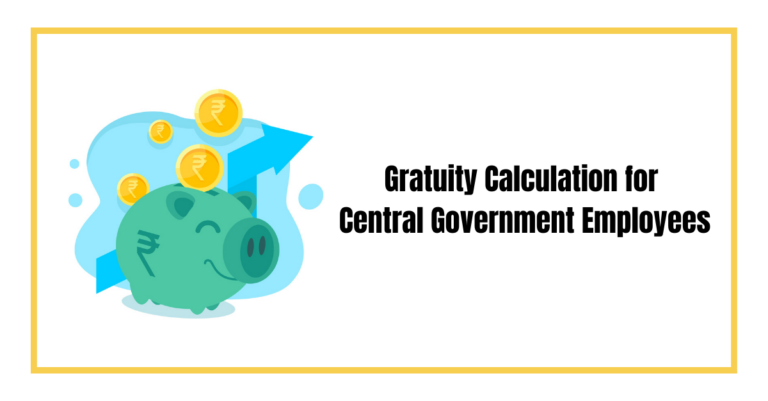In this blog, we'll talk about the importance of Gratuity Act 1972 and why it's essential for employees' welfare. To learn more, keep reading!
Gratuity Act 1972 : A gratuity is a financial reward that an employer gives to an employee in appreciation of the services that the employee has provided to the company. Companies give gratuities to workers who have stayed with them for five or more years. Typically, a gratuity is offered when an employee leaves their position after five years, retires, etc.
What is Payment of Gratuity?
The “Payment of Gratuity Act” of 1972 is the law that governs gratuities. It makes sure that after finishing a certain time period, businesses and organisations provide their staff with a one-time gratuity.
Oil fields, ports, shops, mines, railways, and factories are all subject to the legislation. The gratuity sum is the equivalent of fifteen days’ pay for each year of employment, up to a maximum of Rs. 20 lakhs.
The amount of the gratuity is based on the rate of seven days’ wages for each season in the case of contracts or seasonal businesses. The Act does not restrict an employee’s ability to negotiate improved conditions for gratuities under any contract, agreement, or award with the employer.
The Central Government is the appropriate regulating body for any institution that is related to, controlled by, or has branches in multiple states, as well as any factory, oilfield, railway, significant port, or mine.
Importance of Gratuity Payment Act, 1972
This Act is important because it provides social security to workers after retirement. It is done regardless of whether it results from superannuation, physical incapacity, or impairment of body parts. The Payment of Gratuity Act, of 1972 is a crucial social security legislation for people who earn a living through wages in businesses, factories, and enterprises. It is a welfare law intended for workers who provide their services for an extended length of time and who are regarded as loyal employees. Because it guarantees the working class’s future security, this act is important. This shows the importance of Gratuity Act of 1972.
Eligibility of Gratuity Act
The said benefit is available to employees who have worked for the company for at least five years. If an employee’s employment is cancelled due to death or a disability that prevents them from performing the required services. The need to have completed 5 years of continuous service is not necessary. If the employee passes away, any gratuity due to him must be paid to his nominee or, in the absence of a nominee, to his heirs. If either of these parties is a minor, the share of the minor must be deposited with the controlling authority. who will then invest it for the minor’s benefit in the bank or other financial institution specified until the minor reaches the age of majority.
How does it work
Employers have two options for providing gratuities.They either use the establishment’s finances or go to an insurance provider to buy a group gratuity plan. If the employer decides to use a life insurer, he must make the insurer’s prescribed annual contributions. The employee is free to add money to his gratuity fund as well.
Meaning of Continuous Service
The Act states that an employee who has worked continuously for at least five years will be entitled to gratuity upon the termination of employment.
What does “continuous service” mean? An employee is considered to have been in continuous service for a period of time if he or she has, for that period, been in uninterrupted service.
This includes service that may have been interrupted by illness, an accident, leaves of absence from work without authorization, layoffs, strikes, lockouts, or a cessation of work performed without the employee’s fault, whether the service was performed before or after the start of this Act.
Calculation of Amount of Gratuity
GRATUITY = LAST SALARY DRAWN × 15/26 × NO. OF SERVICE YEARS
ratio 15/26 denotes 15 days out of the 26 working days in a month
Last salary drawn = Basic Salary + Dearness Allowance Service Years are rounded down to the nearest full year.
Payment of Gratuity
When a gratuity is awarded, the employer is required to make arrangements to pay the person within 30 days of the date the gratuity becomes active. which is the day the person retires or has their employment terminated. Employers who owe gratuities under this section but fail to do so within the allotted time shall be required to pay simple interest at the rate set down by the Central Government beginning on the date the gratuity becomes due. The employee may get gratuity via his preferred method of payment in cash, bank check, or demand draft.
Forfeiture of Gratuity
If an employee’s employment has been terminated due to disorderly conduct, any other misdemeanor, or an act that amounts to violence, the employer may withhold or forfeit.
gratuity entirely or in part even if the employee has worked for the company for five years, provided that the offense was committed while the employee was on the job. It should be highlighted that the aforementioned act should have been carried out by an employee while he was working.
Exemption of Tax
The work of the recipient determines whether a gratuity is taxable. For those working for the government, there is no tax on the gratuity. For employees in the private sector, the gratuity is tax-free up to a maximum of Rs 10 lakhs or 15 days’ salary for each year of service that has been completed. If a person has previously received gratuity and a prior exemption has been granted for that exemption, the exemption to be granted during the retirement year will be reduced to the extent of the prior exemption, up to a maximum of Rs. 10 lakhs.
Time Limit for Making Payment of Gratuity
A person may request payment of the requested gratuity by submitting an application to the employer directly or through an authorised representative.
When a gratuity is due, the employer determines how much should be paid. Additionally, the employer notifies the eligible person and the governing authority in writing of the amount decided upon. The employer is required to give the individual to whom the gratuity is due the whole amount of the gratuity within thirty days of the date it becomes due.
Failure to Pay the Gratuity Amount
Gratuities must be paid according to the law. Employers are subject to punishment if they fail to give their employees the proper amount of gratuity. When an employer owes an employee a gratuity but fails to pay it, he or she faces a minimum of six months in jail and a maximum of two years in prison as punishment. The penalties imposed by a court if an employer fails to pay gratuity can be used to assess the importance of the Gratuity Act 1972.
Conclusion – Importance of Gratuity Act 1972
We hope that with the information provided, one has understood the Importance of gratuity Act 1972 and how it aims to secure the future of the working class. Vakilsearch provides you with a gratuity calculator which you can use to calculate the gratuity amount that your organisation owes you.
Also, Read:
- Gratuity Calculator for Central Govt Employees
- How to Calculate Gratuity for Private Sector Employees?
- How Gratuity Calculator Works?










